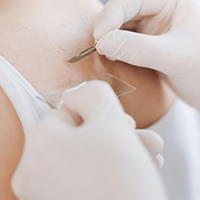
The teenage years can be a difficult time to navigate and caring for your skin can often take a back seat. So, what simple steps can you take to keep your skin healthy?
In this article, dermatologist and Fellow of the Australasian College of Dermatologists Professor Gayle Fischer provides some great advice on ways to keep your skin healthy, and what to do if acne breakouts and other changes to your skin are causing you distress.
Hormonal changes during the teenage years can affect your skin in many ways. One of the most common problems that can occur is acne. As we enter our teenage years, our skin begins to produce more oil, or sebum. Acne can run in families so if your parents had acne, you may be more likely to experience acne breakouts. Stress, such as exams and diet can also play a role.
While acne is a common issue for many teenagers, there are a range of steps you can take to help reduce breakouts and keep your skin healthy.
Keep skincare simple
Less is more when it comes to skin care. Using too many products can irritate your skin and clog your pores, making acne worse. Having a skincare routine can help and the best way to stick to any routine is to keep it simple.
Washing your face morning and night as well as after physical activity with a mild skin cleanser or micellar water is enough. Having a consistent routine is key – putting your skincare products next to your toothbrush can be a great way to ensure you don’t forget to use them.

Moisturise your skin and body regularly
If you have skin that is dry or eczema, one of the best steps you can take to keep your skin hydrated and healthy is to moisturise once or twice a day. Simple formulations with few ingredients are best. Avoid fragranced products especially if you have sensitive skin.
Using moisturisers, sunscreens and makeup that are labelled ‘non-comedogenic’ can also help because they are made from ingredients that won’t clog or block the pores on your skin.
Soap can be drying however your chemist or pharmacy will stock a range of soap substitutes that are less irritating for your skin. Use these if your skin tends to be dry.
Wear sunscreen
Using sunscreen is a critical part of any skincare routine as it helps to protect the skin from UV radiation that can damage skin, make acne worse and cause skin cancer. Make sure the sunscreen you’re using is broad spectrum to protect from both UVA and UVB radiation, and is SPF50 or higher. Remember to be SunSmart if you are spending time outdoors and reapply sunscreen every 2 hours, especially when the UV is 3 or above.
Fake tan
Fake tan is better than risking getting sunburned trying to get a suntan, however if you have sensitive skin or eczema, fake tans can irritate your skin so using a cream product rather than a spray can minimise irritation.
Practice clean make up habits
Leaving makeup on your skin for a long time can clog your pores, leading to breakouts. There are some daily steps you can take to help ensure your makeup doesn’t cause issues for your skin.

- Don’t sleep with you makeup on and be sure to remove all makeup properly when you wash your face.
- Clean your make-up brushes as bacteria can build up and transfer to your face
- Avoid sharing make-up with others, especially products applied to the eyes and lips.
- Throw away old make-up when it starts to smell or looks different, particularly eye makeup.
If you are using fake eyelashes, be aware that you can be allergic to the glue on the eyelashes so if you develop swelling or redness don’t use it again. The same goes for makeup.
Supplements
There isn’t any good evidence that vitamins and supplements that are marketed as making your skin healthier actually work. Eating a balanced diet, getting enough sleep and not smoking is the best way to keep your skin healthy.
Protein powders and muscle building supplements can contain the male hormone DHEAS or testosterone that can cause acne or make existing acne much worse and harder to treat. They can also cause premature baldness and growth of unwanted body and facial hair.
Hair and safe shaving
Learning how to shave properly is a must to help avoid problems like ingrown hairs, razor burn and skin irritation. To help avoid irritating your skin, splash your skin with warm water. This will help hydrate it and open the pores.
Then, after applying shaving cream, shave slowly in short strokes in the direction that the hair is growing and make sure you are not pressing too hard. After shaving, apply a moisturising aftershave to soothe the skin.

Don’t suffer in silence – get help for acne and skin concerns early
If you do have acne or a concern with your skin, it’s important to seek professional help as soon as possible. Popping pimples or picking your skin can aggravate your skin and make acne or other skin conditions worse, and can lead to scarring.
Talking with your GP will be your first step. If your acne or skin condition is persistent or severe, ask for a referral to a dermatologist. Dermatologists are specialist doctors trained in treating skin, hair and nail conditions. They can provide specialist advice and care in understanding what options might be best for you to treat acne and to prevent and treat acne scars.
To find out more about seeing a dermatologist visit our Community pages.

Professor Gayle Fischer is a dermatologist and Fellow of the Australasian College of Dermatologists.
